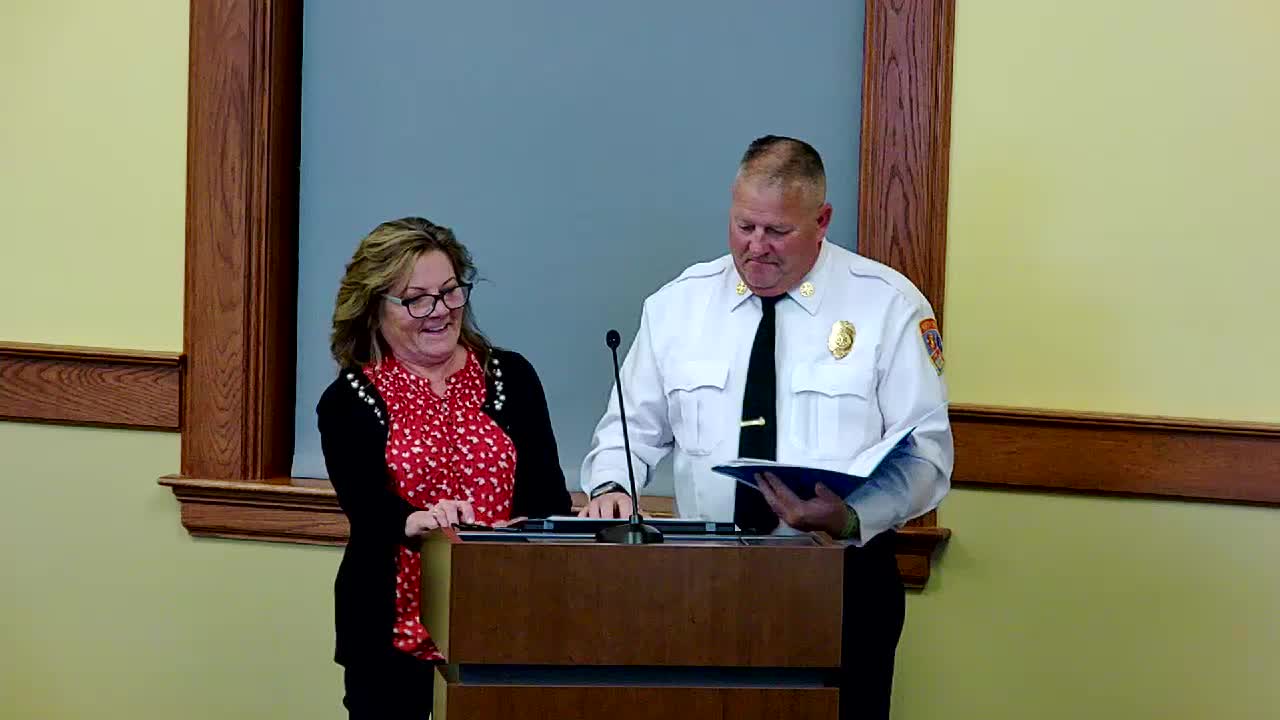North Kingstown fire chief outlines $7.7M in capital purchases funded by rescue-billing account
October 20, 2025 | North Kingstown, Washington County, Rhode Island
This article was created by AI summarizing key points discussed. AI makes mistakes, so for full details and context, please refer to the video of the full meeting. Please report any errors so we can fix them. Report an error »

Fire Chief John Leonard (presented as "John Leonard Creek, fire chief") and the town's finance staff briefed the Town Council on Oct. 20 about the rescue-billing capital account that has financed vehicle purchases and equipment for the department over the last decade.
"The rescue billing account is a capital revenue account established by billing insured health care organizations," Chief Leonard said. He told the council the fund has historically brought in approximately $1 million to $1.2 million annually and that the town budgets $600,000 per year of those proceeds as general-fund revenue to help reduce the tax rate.
Finance staff presented a five-year rolling forecast showing planned replacements and purchases: recent purchases included a ladder truck paid in cash in 2019 and a rescue vehicle recently paid for in cash to avoid high interest financing costs. The packet presented to councilors shows roughly $7.7 million spent from the rescue-billing fund on vehicles, apparatus and equipment across multiple years; when combined with the annual $600,000 transfers, the town estimates the taxpayer benefit at more than $13 million in reduced general-fund pressure over the last decade.
Chief Leonard and finance staff described the department's capital schedule: front-line engines typically on a 3–5 year replacement rotation, rescues every 42–48 months, a special hazards apparatus projected for replacement in the early 2030s (estimated in planning at about $2 million), plus ongoing purchases such as SCBA cylinders, hose and AED maintenance. The chief warned that supply and manufacturing cost increases are driving higher projected prices.
The council asked several operational and policy questions. Members discussed whether the rescue-billing reimbursements covered full costs; the chief said the reimbursement rates from insurers and Medicaid do not fully cover costs. Council members also asked about cooperative procurement and shared buying power; the chief said departments commonly use existing master purchasing agreements or follow rates that larger jurisdictions negotiate.
Ralph, the town manager, said the $600,000 annual transfer is expected to remain stable in the near term and characterized the fund as a capital-reserve mechanism the town uses deliberately to avoid placing equipment costs directly on taxpayers in a single year. He said staff meet periodically to review priorities and that the town strives to keep a minimum balance of $500,000 in the account.
No formal action altering the fund or the $600,000 transfer was taken at the meeting; councilors asked staff to continue updating the capital plan and to notify the council if projected shortfalls or unexpected emergency purchases arise.
"The rescue billing account is a capital revenue account established by billing insured health care organizations," Chief Leonard said. He told the council the fund has historically brought in approximately $1 million to $1.2 million annually and that the town budgets $600,000 per year of those proceeds as general-fund revenue to help reduce the tax rate.
Finance staff presented a five-year rolling forecast showing planned replacements and purchases: recent purchases included a ladder truck paid in cash in 2019 and a rescue vehicle recently paid for in cash to avoid high interest financing costs. The packet presented to councilors shows roughly $7.7 million spent from the rescue-billing fund on vehicles, apparatus and equipment across multiple years; when combined with the annual $600,000 transfers, the town estimates the taxpayer benefit at more than $13 million in reduced general-fund pressure over the last decade.
Chief Leonard and finance staff described the department's capital schedule: front-line engines typically on a 3–5 year replacement rotation, rescues every 42–48 months, a special hazards apparatus projected for replacement in the early 2030s (estimated in planning at about $2 million), plus ongoing purchases such as SCBA cylinders, hose and AED maintenance. The chief warned that supply and manufacturing cost increases are driving higher projected prices.
The council asked several operational and policy questions. Members discussed whether the rescue-billing reimbursements covered full costs; the chief said the reimbursement rates from insurers and Medicaid do not fully cover costs. Council members also asked about cooperative procurement and shared buying power; the chief said departments commonly use existing master purchasing agreements or follow rates that larger jurisdictions negotiate.
Ralph, the town manager, said the $600,000 annual transfer is expected to remain stable in the near term and characterized the fund as a capital-reserve mechanism the town uses deliberately to avoid placing equipment costs directly on taxpayers in a single year. He said staff meet periodically to review priorities and that the town strives to keep a minimum balance of $500,000 in the account.
No formal action altering the fund or the $600,000 transfer was taken at the meeting; councilors asked staff to continue updating the capital plan and to notify the council if projected shortfalls or unexpected emergency purchases arise.
View full meeting
This article is based on a recent meeting—watch the full video and explore the complete transcript for deeper insights into the discussion.
View full meeting